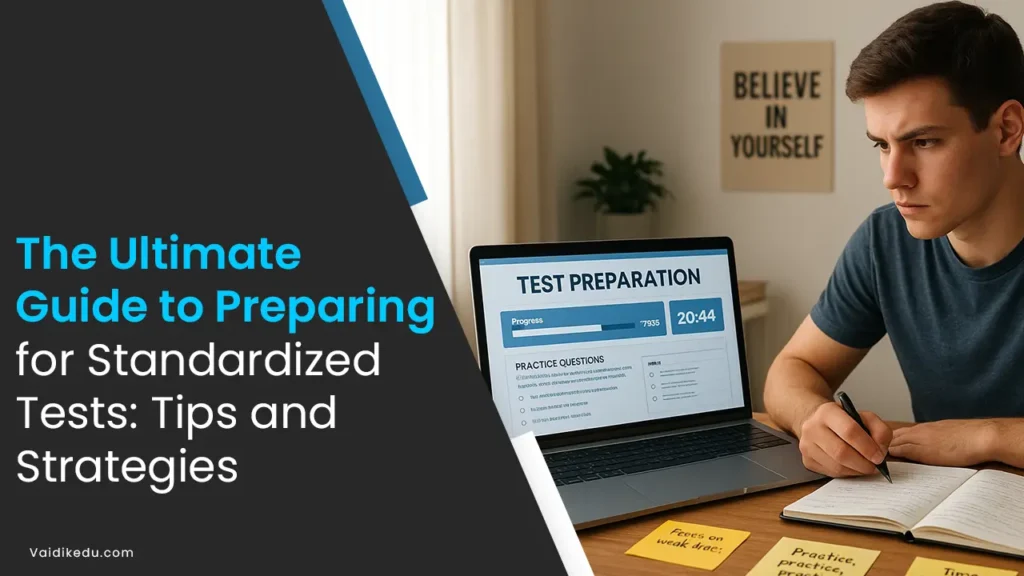
Preparing for standardized tests can be stressful. These tests are important for your future. They are used to measure your skills and knowledge. Colleges, schools, and employers often look at these scores. But don’t worry! With proper planning, you can succeed. This guide will help you prepare step by step.
What Are Standardized Tests
The first step is to learn what standardized tests are. They are the same exams for everyone. The SAT, ACT, GRE, and TOEFL are a few examples. Each test has a unique format and purpose.
Spend some time learning about the test you need to take. Find out the subjects it covers. Learn about the types of questions it includes. For example, some tests have multiple-choice questions. Others might have essays or problem-solving tasks.
Knowing the test format helps you prepare better. You can focus on the skills that matter most. It also reduces stress because you will know what to expect.
Step-By-Step Strategy To Prepare For Standardized Tests
Tips And Strategies:
Start Early:
One of the best strategies is to start early. Begin your preparation months before the test date. This gives you plenty of time to cover all topics. It also allows time to review and practice.
Cramming at the last minute is not effective. It increases stress and can make you forget important information. Instead, create a study plan that spreads your learning over weeks or months.
Create A Study Plan:
A study plan keeps you organized. Start by setting a goal. Decide what score you want to achieve. Then, divide your study time into smaller parts.
For example, you can study one subject each day. Spend extra time on topics you find difficult. Set aside time for review and practice tests. Stick to your schedule, but be flexible if you need to adjust it.
Gather The Right Materials:
Study materials are very important. Use textbooks, online resources, and practice tests. Many tests have official study guides. These guides are designed to match the test format.
You can also use apps and websites to practice. Some offer quizzes and flashcards to help you learn. Choose materials that suit your learning style. If you like videos, find online tutorials. If you prefer reading, get detailed books.
Practice Regularly:
Practice is the key to success. Take practice tests regularly. This helps you understand the test format. It also shows you what areas need improvement.
When taking practice tests, try to recreate the actual test environment. Sit in a quiet room. Use a timer to track your time. This helps you get used to the pressure of the real test.
Review your answers after each practice test. Learn from your mistakes. Focus on the questions you got wrong. This will improve your skills over time.
Focus on Weak Areas:
Everyone has strengths and weaknesses. Identify your weak areas early. Spend extra time improving these skills.
For example, if math is hard for you, practice more math problems. If reading takes you a long time, work on reading faster. Focusing on weaknesses will boost your confidence and overall score.
Learn Test Strategies:
Standardized tests often have tricks and patterns. Learning test strategies can help you score higher. Here are some examples:
1. Eliminate Wrong Answers: For multiple-choice questions, remove the options you know are wrong. This increases your chances of guessing correctly.
2. Manage Your Time: Don’t spend too much time on one question. Move on and come back later if you have time.
3. Read Instructions Carefully: Many students lose points by misunderstanding the instructions. Take a few seconds to read them carefully.
4. Pace Yourself: Work at a steady pace. Avoid rushing through the test.
Take Care of Yourself:
Your physical and emotional wellness is crucial. Get adequate sleep every night. Eat healthful foods to keep your energy levels up. Avoid junk food and caffeine.
Exercise can also assist in relieving tension. Even a brief walk can help to clear your head. Maintain a good attitude and self-esteem. Confidence has a major impact on how well you perform.
Use Study Groups:
Studying with others can be beneficial. Attend a study group or locate a study buddy. You can share tips and learn from one another. Explaining topics to others allows you to better grasp them.
Make sure your study group maintains concentration. Establish specific goals for each session. Avoid distractions such as conversing on your phone.
Seek Help When Needed:
If you find a topic too difficult, don’t hesitate to ask for help. Teachers, tutors, and online forums can provide support. Many resources are available for free.
Sometimes, taking a prep course can be a good idea. These courses are designed to help you succeed. They often include lessons, practice tests, and personal feedback.
Stay Consistent:
Consistency is important. Study a little every day instead of trying to learn everything at once. Regular practice keeps your skills sharp. It also helps you build a habit of studying.
Prepare For Test Day:
Gather all of the necessary materials the day before the test. This includes your ID, test entry ticket, pencils, erasers, and a calculator (if permitted). Lay out your clothing and prepare a snack.
On test day, arrive early. Being late can make you feel nervous. Keep calm and take deep breaths. Remember that you prepared well.
Reflect After The Test:
Once the test is over, take time to reflect. What went well? What could you do better next time? If you need to retake the test, use this experience to improve.
Conclusion:
Preparing for standardized tests takes time and effort. But with a clear plan, the right materials, and consistent practice, you can succeed. Stay positive and believe in your abilities. Remember, the test is just one step on your journey.
Frequently Asked Questions
Standardized tests are exams that are the same for everyone. They measure your skills and knowledge in specific areas. Examples include the SAT, ACT, GRE, and TOEFL.
These tests are often used for college admissions, job applications, or certifications. They help evaluate your readiness and compare your performance with others.
It’s best to start preparing several months before the test date. This gives you enough time to study, practice, and improve.
Set a goal score, divide your study time into small parts, and focus on one subject or topic each day. Include time for review and practice tests. Adjust your plan as needed.
- Eliminate wrong answers in multiple-choice questions.
- Manage your time carefully.
- Read the instructions thoroughly.
- Stay calm and pace yourself during the test.








